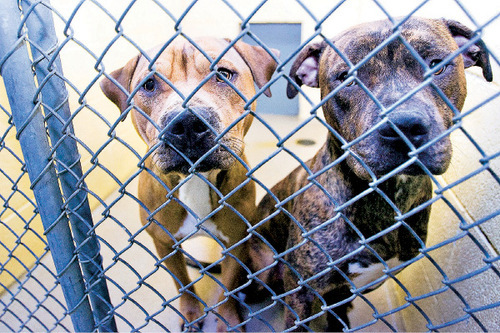This is an archived article that was published on sltrib.com in 2010, and information in the article may be outdated. It is provided only for personal research purposes and may not be reprinted.
Of the 126 dogs quarantined in Ogden's Animal Shelter last year for biting someone, 40.5 percent were either pit bulls or pit-bull mixes.
That statistic, from shelter manager Bob Geier, spurred city administrators to draft an ordinance that would crack down on the breed. The City Council will consider the draft ordinance Tuesday.
"People are training dogs to be aggressive, and the dog of choice in this area is the pit bull," Councilman Brandon Stephenson said.
Ogden Police Chief Jon Greiner said officers have handled a number of dog-bite calls involving pit bulls, although his department did not request the ordinance.
"It's tough as a dog owner to put all the blame on a breed of dog when invariably it has a lot to do with how a dog is raised and handled," he said. "In this circumstance, it's the breed as well as those who choose this breed because of its aggressive tendencies."
The council discussed a similar proposal a year ago, but abandoned that effort after significant outcry from canine advocates who, among other things, opposed pinning the problem on a specific breed. The proposed statute takes a less stringent approach but still has breed-specific language — and that could be problematic.
Regulations targeting specific dog types are "canine-profiling," said Ledy VanKavage, senior legislative analyst for Kanab-based Best Friends Animal Society.
"You do want a generic dangerous dog law that addresses any dog behaving badly," VanKavage said, adding research places blame on reckless owners more than particular breeds.
Ogden's proposed statute defines pit bulls as an American Pit Bull Terrier, American Staffordshire Terrier, Staffordshire Bull Terrier, "Red Nose" Pit, "Blue Nose" Pit, or any dog of mixed breed displaying the majority of physical traits of one or more of those breeds.
A licensed veterinarian or city animal control officer could place a pooch in that particular category, it says. Only dogs with written notices from a Utah-licensed vet — stating they have no pit bull in their lineage — would be exempt.
VanKavage criticizes what she sees as a knee-jerk tendency to paint all dogs of a certain appearance with a broad brush — without considering the consequences. "We are fighting this all over the country," she said.
Any dog can bite, VanKavage added, but to accurately determine whether a dog has pit bull traits requires a costly DNA test. She noted that animal control wardens tend to categorize dogs incorrectly about 75 percent of the time.
"We want the ordinance to be so broad that it protects people from any dog acting badly," VanKavage said.
State-specific data compiled by New York City-based John Dunham & Associates contends that Ogden's prospective ordinance could cost the city an extra $109,900 per year to enforce and defend — while accomplishing very little.
That total includes $68,120 for animal control and enforcement, $15,070 for kenneling and vet care, $14,670 for euthanasia and carcass disposal, $1,180 in anticipated litigation costs and $10,820 for DNA testing.
Actual costs could run higher, the report said, if the shelter must hire a veterinarian, more enforcement staff or expand its capability to house animals.
Hank Greenwood, president of the American Dog Breeders Association Inc., said the slang term 'pit bull' can describe any of three breeds, or up to 30 breeds, and their mixes.
"That's why 'pit bull' as a designation has widely become recognized as a type, not a breed," Greenwood said, "a type that could potentially describe countless … medium- and large-breed dogs."
Banning or restricting specific breeds simply gives the public a false sense of security, Greenwood added.
While Ogden works to enact its breed-specific ordinance, officials in Topeka, Kan., are moving to repeal their decade-old pit bull ban, citing reasons such as unforeseen costs.
"Over the past nine years, the Topeka Police Department's budget for operating Animal Control has run over budget an average of $30,000 per year … plus vet bills," due in large part to non-vicious dogs being held as unlicensed pit bulls, according to a city fact sheet.
Council to discuss proposed ordinance
When • Tuesday, immediately following 6 p.m. city council meeting
Where • Ogden Municipal Building, 2549 Washington Blvd., Room 340
Presenters• Ogden's Animal Services Manager Bob Geier; Chief Deputy City Attorney Mara Brown; Hank Greenwood, president of American Dog Breeders Association; Melissa Lipani of Best Friends Animal Society.
Public comment will also be taken
Source • Ogden City Council Office —
Proposed pit bull ordinance
Restrictions outlined in the proposal before the Ogden City Council include:
Owners must carry $25,000 in liability coverage.
Landlords or property owners — if not the dog's owners — must give written permission for the animal to reside there.
City workers can inspect the dog's home at any time.
Owners must notify animal control any time the animal gets loose or has attacked a person or another animal.
If the dog changes hands, the former owner must provide the city with the new owner's contact information by the end of the next business day.
The dog must have a microchip ID implant — at the owner's expense — at the time of licensing.
When outdoors, the dog must be confined in a secure kennel or fully fenced yard. When not confined, it must be kept on an adequate chain or leash.
The dog's place of confinement must be marked by a "Beware of Dog" sign that measures at least 10 by 14 inches.
Violations would be a class B misdemeanor.
Source • Ogden City Council



